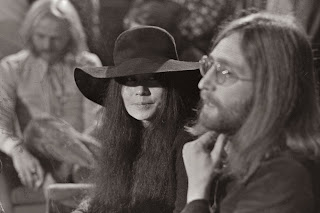War is Terrible, Wrong, Alien and Must Be Stopped
By William Doyle-Marshall
The horror of war which is captured in
Ritchie Yorke’s book “Christ You Know It Ain’t Easy: John and Yoko’s Battle for
Peace” was launched at an opportune time, when Canadians were going to the
polls to elect a new government -- the Liberals with 184 seats in the House of.Commons It was particularly relevant when Stephen
Harper and his Conservatives were campaigning and trying to motivate Canadians to
vote with fear in their hearts.
Speaking with me about the reality of
war, Yorke noted the majority of victims of World War Two were soldiers but today
the majority of people dying in a variety of war activities are individuals off
the firing line who are getting killed. He thinks everything about war is
awful. “I don’t think a single redeeming feature that makes war a good thing on
any level. I think it’s terribly wrong, totally alien. I think war is wrong!
Wrong! Wrong!”
The Lennon Peace anthem crafted in a one week
bed-in in Montreal in 1969 resonates today as it did then. Yorke, the rock
journalist and activist has detailed his recollections of that week and The Toronto Varsity Rock Concert. John
meeting (Pierre) Trudeau. And his Traveling the World For Peace with Ronnie
Hawkins in his new book “Christ You Know It Ain't Easy: John And Yoko's Battle For Peace” was launched in Toronto early October --
two days before Lennon’s 75thbirthday.
Yorke hopes young people
would read his book because he is confident they are the ones who might change
the world. “They are the ones who are voting and they are out there being part
of the issues,” Yorke emphasized.
“Canada next Monday is
having a federal election. People should be out voting against the forces that
bring war and I can hardly tell you which of the candidates support war and I
think that’s what has to happen. People have to go out and vote: they don’t
warn this. Please stand up for peace, stand up for another way of doing things.”
He questioned why would you
want for example to go and kill somebody you haven’t met, you don’t know. It’s
sort of understandable if someone done something in your life and impinged on
your space or your person or property then you might want to do something about
that. “But to go and shoot people you have never even met, that’s insane.
That’s totally crazy in my world,” the author continued.
Ritchie was given an
ultimatum to either quit his job then as a writer for the Globe and Mail or
stay with the Lennon project. It was rather easy for him because he was
convinced that working on the side of peace and goodwill and humanitarianism
was obviously more important than a journalistic career. “What we are all
trying to do is make a better world for ourselves and our children and that’s
what I was trying to do,” he concluded.
While he is not certain about the success of that effort, Yorke is
aware that there are much room for improvement. “I’d like to think we’ve made
some progress but I think there is a lot of room to go to keep doing it to make
it better,” he said this week while in Toronto promoting his book. Yorke
reflects on his close relationship with Lennon and concludes that the message
of the Beatle was very simple “war can be over if you want it. If you want to
do something about it and most people have to support war and most people have
to support the whole notion of killing other people do it because that’s the
only way we would stop it really. We got to get the politicians in there who
are totally against war and there is not a lot of them, I don’t think. People
talk about it but talk is cheap. Doing something about it that’s what we need
to have more of, I think. This is an issue we need to have people talk about
all the time.”
This quote from the book is a worthy climax
against those Canadian politicians who are campaigning on the issue of fear.
“Still war and suffering drag on. In the past year, 24 million people were
displaced by various ill-fated wars, bringing the total of the world’s refugees
to 42 million. It is a sobering thought to realize that 44 per cent of all
refugees are children. Another damning statistic. During World War I (1914-1918),
95 per cent of war casualties were armed participants and 5 per cent were
civilian casualties. Almost a century later, 97 per cent of war casualties are
civilians. What the hell are we doing allowing this absurd behaviour on this
planet? Where is love and compassion when you need it?”
Hopefully you now understand the
importance of scrutinizing your conscience and always voting according to that. No time
to be swayed by half truths or blatant lies. Canadians and others should get themselves a copy of Yorke's book and prepare themselves better for dealing with the new Trudeau Liberal Government. Politicians are your employees and not the other way around.


No comments:
Post a Comment